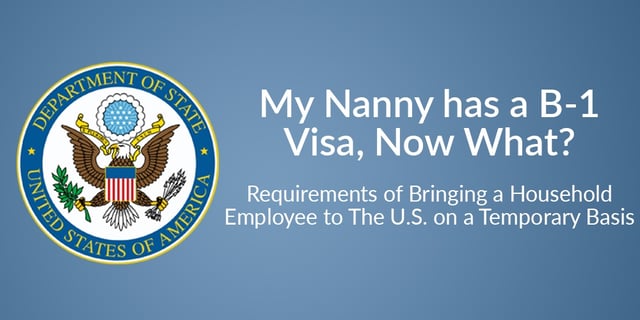
US Citizens and foreign nationals coming to the US for a temporary stay may legally bring their nanny or other domestic help with them by securing a B1 visa. These employers are typically senior executives for large corporations and certain US government employees routinely posted abroad. The US State Department, which oversees the issuance of the B1 visas, imposes certain requirements on the employer to ensure that the foreign domestic worker is treated in accordance with US labor laws and is not exploited.
The employer and the domestic worker must enter into a written employment contract guaranteeing payment of the prevailing wage for an 8-hour workday and provide any benefits normally required for US domestic workers. B1 visas are typically valid for six (6) months to one (1) year but may be extended and are only valid for employment with the sponsoring employer.
The domestic employee must have one (1) year of experience; be at least 16 years old, and may not be a family member of the employer. A US citizen employer must ordinarily reside outside the U.S. and be traveling to the US temporarily; or be subject to frequent international transfers lasting 2 years or more, and is going to reside in the U.S. for less than 4 years. The employer-employee relationship must have existed for at least 6 months, or the employer must have regularly employed a domestic employee in the same capacity abroad. Green card holders are NOT allowed to bring domestic employees under any circumstances. Foreign nationals with non-immigrant visas (e.g. B, E, F, H, I, J, L, M, O, P, Q, R or TN) must have employed the domestic help abroad for at least 1 year.
Upon arrival to the United States the B1 Nanny must immediately apply for work authorization from the USCIS and obtain an EAD card. Upon receipt of the EAD, the B1 nanny must also make application for a Social Security Number for reporting of payroll and income taxes on US earnings.
Non-immigrant employers need to submit with the application evidence of their own working visa and; proof that the nanny was employed by them abroad for at least 1 year before coming to the United States, OR that he/she had at least 1 year's prior experience abroad in this capacity and that the current employer in the U.S. previously employed a nanny abroad. The employer will also need to provide some evidence of his/her permanent residence abroad that he/she has no intention of abandoning. The non-immigrant employer will also need to apply for a Social Security Number to comply with US tax laws.
U.S. citizen employers need to submit with the application evidence of U.S. citizenship; evidence that they have a permanent home abroad or are stationed outside the United States and are temporarily visiting the United States or that the current assignment in the United States will not be longer than 4 years; and, evidence that the nanny was employed by the U.S. citizen employer as a domestic worker abroad for at least six (6) months prior to his/her admission to the United States.
The B1 nanny, while working in the US, is protected by most Federal and state labor laws – including minimum wage and overtime payments, paid sick leave - and is subject to both employment and income taxes.
The employment contract requires full time employment. The B1 nanny must leave the US upon termination of the visa, and as such is ineligible for unemployment insurance payments. Domestic workers and their employers – whether US citizen or foreign national – are required to report earnings in the United States and file and pay all appropriate payroll and income taxes. It would be wise to seek a knowledgeable payroll tax consultant, like HomeWork Solutions, who can advise on how to report and file taxes as a non-resident.
About the Author:
Elaine Frisbee is an immigration law professional with over 35 years of experience, assisting individuals and companies navigate the myriad of laws, regulations, policies and procedures with the USCIS (formerly INS), Department of Labor, and U.S. State Department.
